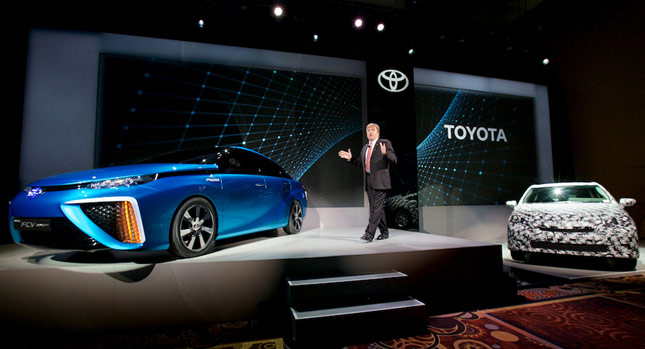Toyota is displaying its FCV concept car along with a camouflaged engineering prototype at the 2014 Consumer Electronics Show in Las Vegas.
The Japanese automaker says it will launch the car on the U.S. market in 2015 at a “reasonable” but unspecified price with a targeted 300-mile (483-km) range. Furthermore, filling-up the car will take between 3 and 5 minutes.
The prototype on display at CES has been used for extensive and extreme on-road testing in North America for more than a year, with Toyota saying it has “consistently delivered a driving range of about 300 miles, zero-to-sixty acceleration of about 10 seconds, with no emissions, other than water vapor.”
Bob Carter, senior vice president of automotive operations at Toyota Motor Sales, said the carmaker is doing a good job with building the vehicle at a reasonable price and helping kick-start the construction of convenient hydrogen refueling infrastructure. He added the production fuel cell vehicle will launch in 2015, initially in California. That’s because The Golden State has approved more than $200 million in funding to build about 20 new stations by 2015, a total of 40 by 2016, and as many as 100 by 2024.
Toyota says it has dramatically reduced the cost of building a fuel cell powertrain since 2002, when it began testing and developing prototypes. The carmaker estimates a 95-percent cost reduction in the powertrain and fuel tanks of the vehicle it will launch in 2015, compared to what it cost to build the original prototype in 2002.
Furthermore, the size and weight of the FCV’s powertrain has been significantly reduced while maintaining a total output of more than 100kW (134hp). Another advantage of the FCV is that a fully-fueled vehicle will be capable of supplying enough energy to power a house for a week in an emergency.
By Dan Mihalascu
PHOTO GALLERY









































